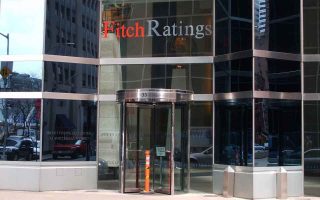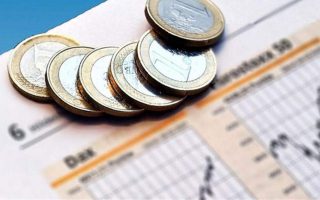Fitch officials project bright future for Greece

Senior Fitch Ratings officials have expressed their optimism in comments to Kathimerini about Greece’s fundamentals in 2020, just a few days after the agency upgraded the country’s credit rating one notch, and offered a roadmap out of “junk” territory.
Michele Napolitano, senior director and head of Western Europe Sovereigns at Fitch visited Athens last week for the company’s conference on Greece’s credit prospects. He told Kathimerini that the government’s 2.8 percent growth target for this year is feasible and that the reduction of the primary surplus targets would be very important if attained.
Napolitano concedes it is difficult to forecast Greek growth “as numbers are quite volatile,” though Fitch has raised its growth forecast for this and next year to 2.5 percent.
Mr Napolitano, Greece issued a 15-year bond last week and attracted strong demand from long-term investors. How important is this step for Greece?
It sends a positive signal to the market because it consolidates the presence of Greece in the international capital market, which should also be positive for other Greek issuers, for banks and corporates. Greece doesn’t really need to issue given the its gross financing requirements. The Public Debt Management Agency is issuing in order to send a signal to investors and also to test the quality of investors. Issuing successfully a 15yr bond implies that there is a significant number of institutional investors, long term investors willing to invest in Greece, that have confidence in Greece. We believe issuing a 15yr bond can also help the government in constructing the narrative that confidence in Greece is coming back.
Fitch’s key assumption in its latest credit report on Greece was that there will be an agreement for the lowering of 1 percent the target from 2021 onwards. How has Fitch come to the 1 percent reduction projection. And, in case there is no agreement, will Greece’s rating and outlook be affected?
What we have written in the report is based on our analysis that if the primary surplus is reduced by 1 percent and the proceeds are used to fund some growth friendly measures (which could have a positive impact on growth) the impact on the debt trajectory, on the debt dynamics could actually be positive.
How we came up with the 1 percent? It is simply because this figure is the one that has already been quoted widely in the press, rather than us ourselves sending a signal to the creditors. To be very clear, our projection for 2.5 percent surplus in 2021 is based on this analysis and we assume that the reduction would be agreed with the creditors. We are not making a judgment that Greece will miss the targets.. What we are saying is that a reduction in the primary surplus to 2.5 percent of GDP would not be negative for the debt dynamics and could prove to be positive for sovereign credit worthiness if there was a positive impact on growth.
Clearly, a good relationship with the creditors is important so if there was a reduction in the targets it would be after an agreement between Athens and the creditors.
The reduction of the surplus targets is one of the three requests the Greek government has submitted to the creditors so as to secure some additional fiscal space.The two other requests are a)the option of transferring any primary surplus overruns to the following year (smoothing mechanism), and b) the use of SMPs and ANFAs for investments. Will an agreement on these be considered credit positive by Fitch?
If there was an agreement on the three requests the Greek government has made to the creditors it would mean that Greece is on track, it is delivering on a number of areas that are also important for Fitch’s rating assessment, it would be a sign that things are moving in the right direction. It is too early to tell whether the package could have a positive credit impact.
The Greek government has stated that it aims to regain investment grade by H1 2021. Is this target an achievable one? Could you name the factors that Fitch is/will be looking at in order to move Greece to the IG club?
Getting back to investment grade in this time framework (1H 2021) is challenging but not unfeasible. The main factors that we are looking at are:
Firstly, developments with investments. In order to be confident with the Greek story and the Greek debt sustainability analysis over time, Greece needs to grow to sustainable rates and given the collapse in investment since the crisis there is need for investment in quite a lot of areas of the economy. So developments with investment, ability to attract investments, reforms to try and make Greece more attractive to investment is something that can support the rating upwards.
Second factor is the banking sector. Acceleration of the reduction in NPLs, how the Hercules plan will work in practice, reform of the insolvency regime and if it will accelerate an improvement in banking sector metrics, if there are upgrades from Fitch’s banking team on the individual rating of the banks, are also factors that would affect the sovereign rating.
Third is the maintenance of fiscal prudence. Surely Greece’s fiscal performance has been remarkable. We have highlighted in the past our concerns about the sustainability of the fiscal policy mix. We think that maintaining primary surpluses with the quality of fiscal adjustment that we have seen so far which is very reliant on tax increases and under-execution of productive capital spending probably is not sustainable in the medium term. Now the new government is targeting a shift and we welcome that. So, further evidence that Greece is able to maintain a prudent fiscal stance while at the same time rebalancing the fiscal policy mix is also something we would view positively.
It is difficult to quantify the impact but if we see gradual progress in these three areas at the same time, the rating could move up quite fast.
Fitch revised upwards the projection of Greek GDP growth in 2019-2021 (from 1.9 percent to 2.2 percent in 2019, from 2.2 percent to 2.5 percent in 2020 and from 2 percent to 2.5 percent in 2021). What drove these revisions? Is government’s target for 2.8 percent growth in 2020 achievable?
The caveat is it’s been quite difficult to forecast Greek GDP as numbers are quite volatile. In our previous report in August 2019 the data for the first half of the year were actually quite weak and then there was an upward revision.
The reasons why we upgraded the forecast are various. The data flow from 2019 has shown quite a resilient picture. We have a clear slowdown in the eurozone, external trade is weak but actually Greek exports proved resilient and we think that’s the result of a number of factors. Greek exports are more competitive than they used to be and also the composition of Greek exports has been more resilient to the slowdown. Also, after the elections there has been a big boost in confidence indicators so coupled with the increase in disposable income (consumer confidence very high, increased disposable income, labour market improvement), these factors should support consumption.
We also think that an important assumption – and probably that’s what can explain the difference in our projections compared to the creditors’; projections – is that we expect some lift in investment in 2020 and 2021. Real estate sector improvement, for example, is one area where investment is picking up and we think the dynamic will improve further and that should feed through to higher gross fixed investment number. We also assume that some of the projects will start to be implemented (Elliniko project).
Confidence indicators are at a record high, the labour market is performing well, dynamics in disposable income are quite positive, financing conditions are improving and there is more attention from international investors towards Greece – which is quite clear not only in the bond market but in the real economy as well. We think that all the ingredients to have a positive growth dynamic are there and that is why we have upgraded Greece to ‘BB’ and with a positive outlook. The 2.5 percent rate we believe is quite cautious because it still assumes that the gross fixed investment will be quite subdued and it also assumes that private consumption will be quite subdued. So, 2.8 percent we believe is achievable but for now we prefer to stick with 2.5 percent, we prefer to be cautious.





